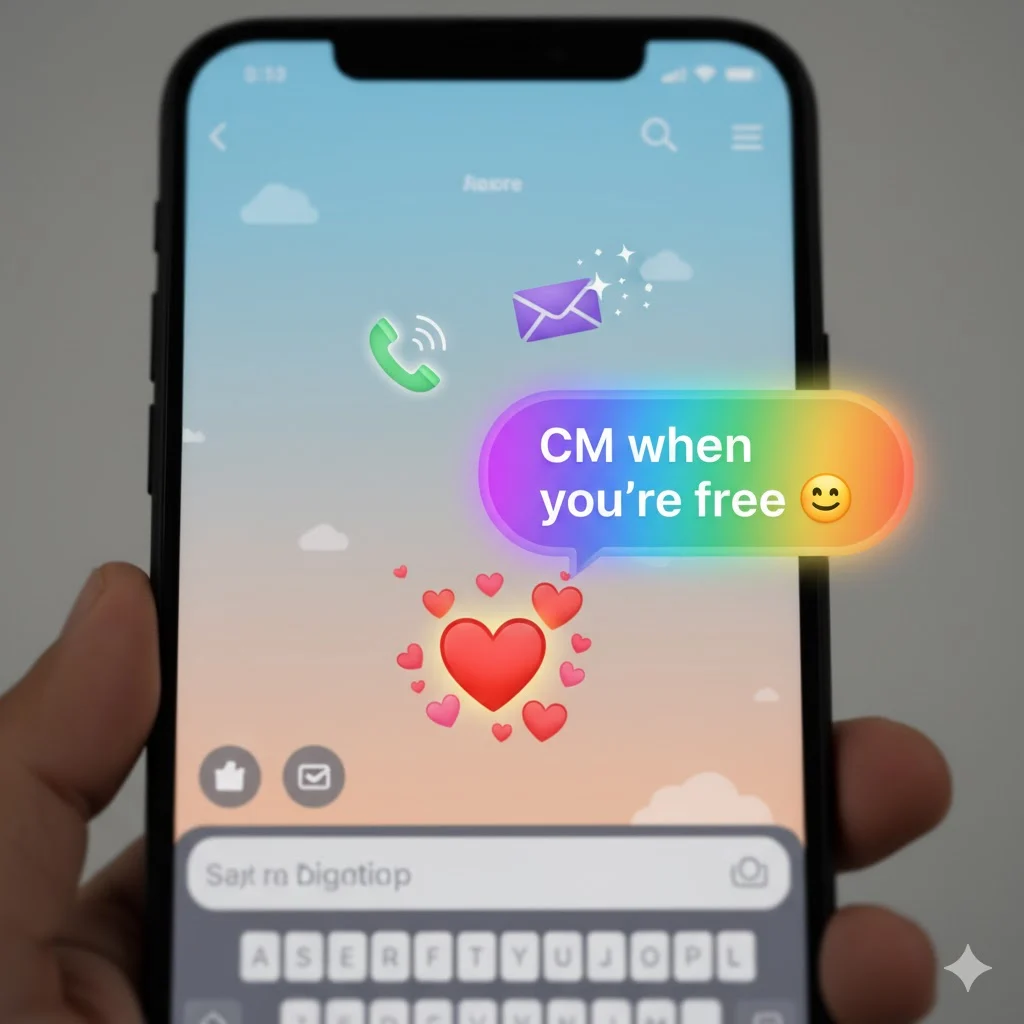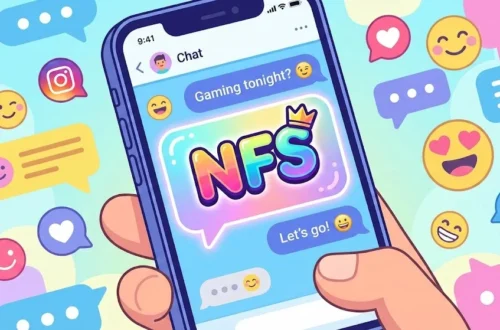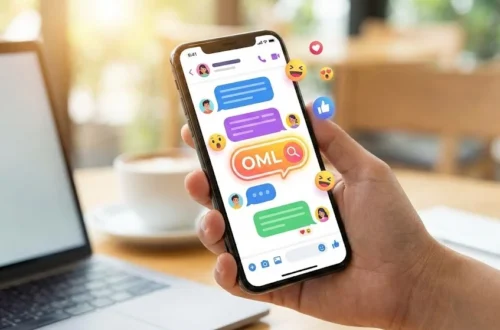Hey there! 👋 Have you ever been scrolling through your DMs or chatting online when someone suddenly types “CM” — and you’re left wondering, “What does that even mean?”
Don’t worry, you’re not alone. In today’s world of rapid-fire texting and abbreviations, new slang terms pop up almost every week. Some are easy to decode, but others — like CM — can mean a lot of different things depending on where and how they’re used.
If you’re a texter, social media user, gamer, or just curious about internet lingo, this post is for you. We’ll break down exactly what CM means in text, where it comes from, how people use it, and when to use or avoid it. By the end, you’ll never have to Google it mid-conversation again!
Definition & Meaning
Let’s start simple:
CM can stand for different things depending on context — but the most common meanings in text are:
- Call Me
- Comment
- Confession Message
- Check Message
That’s why CM is one of those flexible abbreviations that changes meaning based on the situation.
1. “CM” = Call Me
This is the most common use. When someone texts “CM”, they’re asking you to give them a call.
Example:
John: “Hey, got something to tell you. CM when you’re free.”
(Translation: Call me when you’re free.)
It’s quick, casual, and perfect when you don’t have time to type a full sentence.
2. “CM” = Comment
In social media posts or group chats, CM can mean “comment” — often used when creators want engagement.
Example:
Influencer: “CM your favorite emoji if you love this outfit!”
(Translation: Comment your favorite emoji.)
3. “CM” = Confession Message
In online trends, especially among younger users, CM can mean “Confession Message” — often used in anonymous confession games or Instagram story challenges.
Example:
“Send a CM if you’ve ever liked someone secretly 👀”
4. “CM” = Check Message
When used in a hurry or in business chats, it can mean “Check Message” — as in “Check your inbox.”
Example:
“CM your DMs — I sent the file.”
Background & History
The abbreviation CM has existed since the early days of SMS texting, when character limits forced people to shorten words. Instead of writing “call me,” texters began using CM.
As social media evolved, new meanings appeared.
- On Facebook, it started meaning “comment.”
- On Instagram and TikTok, it became shorthand in captions or challenges.
- In messaging apps, it remained a quick way to say “call me.”
Now, it’s a multipurpose term — part of the internet’s ever-evolving shorthand language.
The beauty of CM is that it’s universal and time-saving, but its meaning always depends on who’s saying it and where it’s said.
Usage in Various Contexts
Let’s explore how CM appears across different settings.
1. Texting / DMs
Friend: “Got something important. CM ASAP.”
You: “On it! Give me 5 mins.”
Here, CM = Call Me — short and urgent.
2. Social Media Posts
“CM if you want me to drop the recipe 👀”
“CM your favorite quote below!”
In this context, CM means comment — used to encourage interaction.
3. Online Games
Player1: “CM later, I’ll tell you the trick to beat that boss.”
Player2: “Cool, talk soon.”
Gamers often use CM as a quick code for “call me” or “contact me.”
4. Flirty / Personal Chats
Person A: “CM when you’re alone 😉”
Person B: “Haha okay 👀”
Here, it can carry a flirty or private tone, depending on the relationship.
Common Misconceptions & Clarifications
Because CM has several meanings, it often causes confusion. Let’s fix that 👇
❌ Misconception 1: CM Always Means “Call Me”
Not always! While “call me” is common, it can also mean comment, check message, or confession message. Always check the context.
❌ Misconception 2: CM Is Only Used by Teens
Nope! Professionals sometimes use it too — especially in quick work chats:
“CM your inbox when you can.”
❌ Misconception 3: It’s a Modern Trend
Actually, CM has existed since early text messaging days — long before TikTok or Instagram trends.
✅ Truth: Context Is Everything
The only way to know which meaning fits is to read the situation.
If it’s in a DM — likely “call me.”
If it’s under a post — probably “comment.”
If it’s in a trend — “confession message.”
Similar Terms & Alternatives
| Term / Slang | Meaning / Use | Context |
|---|---|---|
| LMK | Let Me Know | General chats |
| HMU | Hit Me Up | Casual / friendly |
| DM | Direct Message | Social media |
| PM | Private Message | Forums / online games |
| MSG | Message | Neutral, general |
| TXT ME | Text Me | Personal chats |
All of these, including CM, are ways to invite or prompt communication — just in different forms.
How to Respond to CM
Depending on how it’s used, you can respond in different ways 👇
1. If It Means “Call Me”
Them: “CM when you’re done.”
You: “Sure, calling you in 10!”
2. If It Means “Comment”
Them: “CM your thoughts below!”
You: “Done! Loved it 😍”
3. If It Means “Confession Message”
Them: “Send a CM if you’ve ever had a crush on me.”
You: “Haha maybe 👀”
4. If It Means “Check Message”
Them: “CM your email, it’s urgent.”
You: “Got it, checking now.”
Always match the tone — casual with friends, clear with professionals, playful with close ones.
Regional or Cultural Differences
CM is globally recognized because it’s based on English words, but usage can vary slightly:
- In North America & the UK, “CM” mostly means “Call Me.”
- In Asia (especially in fandom communities), it can mean “Comment” or “Confession Message.”
- In corporate chats or professional environments, it’s sometimes short for “Check Message” or “Contact Me.”
Since it’s not tied to any single culture or language, CM is one of the few abbreviations that feels universal in digital spaces.
Comparison with Similar Terms
| Expression | Meaning | Tone | Use Case |
|---|---|---|---|
| CM | Call Me / Comment | Neutral | Texting & social media |
| HMU | Hit Me Up | Casual | Friendly chats |
| DM | Direct Message | Neutral | Online platforms |
| PM | Private Message | Slightly formal | Forums / business |
| TXT ME | Text Me | Casual | Everyday use |
| CALL ME | Direct instruction | Strong | Urgent or serious |
Usage in Online Communities & Dating Apps
On social media or dating platforms, CM is a quick, casual call to action.
Examples:
- Instagram Bio: “CM if you vibe with good energy ✨”
- Tinder Chat: “CM when you’re free tonight 😉”
- TikTok Caption: “CM your favorite lyric below!”
- Gaming Forum: “CM later for raid strategy.”
It’s light, easy, and blends perfectly with internet language — just make sure you’re clear about which meaning you intend!
Hidden or Offensive Meanings
Unlike some slang terms, CM is not inherently rude or offensive.
However, context can make it sound suggestive — especially in flirtatious chats.
For instance:
“CM later 😉”
could sound playful or romantic depending on tone and relationship.
So, while CM is safe to use, watch how you pair it — emojis, tone, and timing can change its meaning completely.
Suitability for Professional Communication
CM can be used in light professional contexts, but not in formal emails.
For example:
✅ Acceptable in chat:
“CM your inbox when possible.”
🚫 Avoid in email:
“CM about the project.”
Instead, say:
“Please give me a call when convenient.”
or
“Kindly check your messages when you have a moment.”
Rule of thumb: Use CM in fast, friendly work chats — not in client-facing or official communication.
FAQs
1. What does CM mean in text?
It usually means “Call Me,” but can also mean “Comment,” “Check Message,” or “Confession Message.”
2. How do I know which meaning is correct?
Check the context — who said it and where. That’s your clue.
3. Is CM appropriate for work?
Only in informal chats. Avoid it in formal writing.
4. Can CM be flirty?
Yes, especially when used like “CM later 😉.”
5. What’s the difference between CM and HMU?
Both invite communication, but CM means call me while HMU means message or contact me.
6. Does CM have any bad meanings?
No, it’s generally safe. Just don’t overuse it in formal settings.
7. Is CM old or new slang?
It’s been around since early texting days — one of the OG abbreviations that still survives today.
Conclusion
To wrap it up — CM is one of those versatile abbreviations that’s simple but powerful.
It can mean Call Me, Comment, Check Message, or Confession Message, depending on where you see it.
The secret to using it right? Context and tone.
Use CM to keep your chats short, friendly, and expressive — but swap it out for full words in serious or formal messages.
Now that you know the real meaning behind CM, you’ll never be caught guessing again. Next time it pops up on your screen, you’ll know exactly what to say. 😉






